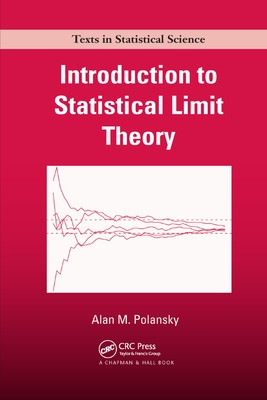
- We will send in 10–14 business days.
- Author: Alan M Polansky
- Publisher: CRC Press
- ISBN-10: 0367383136
- ISBN-13: 9780367383138
- Format: 15.6 x 23.4 x 3.3 cm, softcover
- Language: English
- SAVE -10% with code: EXTRA
Reviews
Description
Helping students develop a good understanding of asymptotic theory, Introduction to Statistical Limit Theory provides a thorough yet accessible treatment of common modes of convergence and their related tools used in statistics. It also discusses how the results can be applied to several common areas in the field.
The author explains as much of the background material as possible and offers a comprehensive account of the modes of convergence of random variables, distributions, and moments, establishing a firm foundation for the applications that appear later in the book. The text includes detailed proofs that follow a logical progression of the central inferences of each result. It also presents in-depth explanations of the results and identifies important tools and techniques. Through numerous illustrative examples, the book shows how asymptotic theory offers deep insight into statistical problems, such as confidence intervals, hypothesis tests, and estimation.
With an array of exercises and experiments in each chapter, this classroom-tested book gives students the mathematical foundation needed to understand asymptotic theory. It covers the necessary introductory material as well as modern statistical applications, exploring how the underlying mathematical and statistical theories work together.
EXTRA 10 % discount with code: EXTRA
The promotion ends in 20d.17:04:47
The discount code is valid when purchasing from 10 €. Discounts do not stack.
- Author: Alan M Polansky
- Publisher: CRC Press
- ISBN-10: 0367383136
- ISBN-13: 9780367383138
- Format: 15.6 x 23.4 x 3.3 cm, softcover
- Language: English English
Helping students develop a good understanding of asymptotic theory, Introduction to Statistical Limit Theory provides a thorough yet accessible treatment of common modes of convergence and their related tools used in statistics. It also discusses how the results can be applied to several common areas in the field.
The author explains as much of the background material as possible and offers a comprehensive account of the modes of convergence of random variables, distributions, and moments, establishing a firm foundation for the applications that appear later in the book. The text includes detailed proofs that follow a logical progression of the central inferences of each result. It also presents in-depth explanations of the results and identifies important tools and techniques. Through numerous illustrative examples, the book shows how asymptotic theory offers deep insight into statistical problems, such as confidence intervals, hypothesis tests, and estimation.
With an array of exercises and experiments in each chapter, this classroom-tested book gives students the mathematical foundation needed to understand asymptotic theory. It covers the necessary introductory material as well as modern statistical applications, exploring how the underlying mathematical and statistical theories work together.


Reviews